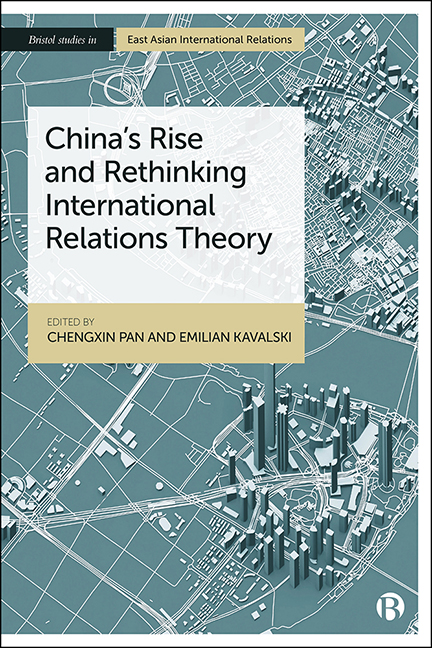Book contents
- Frontmatter
- Contents
- List of Abbreviations
- Notes on Contributors
- Acknowledgements
- Introduction: The Rise of China and Its Challenges to International Relations Theory
- PART I Theorizing China’s Rise: Beyond Eurocentric Knowledge Production
- PART II Theorizing China’s Rise: Critical Reflection on Mainstream Frameworks
- Epilogue: Towards International Relations beyond Binaries
- Index
3 - What Can Guanxi International Relations Be About?
Published online by Cambridge University Press: 15 September 2022
- Frontmatter
- Contents
- List of Abbreviations
- Notes on Contributors
- Acknowledgements
- Introduction: The Rise of China and Its Challenges to International Relations Theory
- PART I Theorizing China’s Rise: Beyond Eurocentric Knowledge Production
- PART II Theorizing China’s Rise: Critical Reflection on Mainstream Frameworks
- Epilogue: Towards International Relations beyond Binaries
- Index
Summary
Introduction
Bemoaning the deepening fractures in Sino– US relations, Yangyang Cheng (2021), a Chinese-born scholar working in the United States, noted in exasperation that she finds herself ‘at a loss for words’. Cheng was not merely vexed by the mutually reinforcing centrifugal forces of Beijing's growing authoritarianism, which prevented free exchange of ideas both within China and between China and the world, but also by the intensifying (and thinly veiled xenophobic) Western rhetoric that China is either a threat to be managed or a problem to be resolved. While these dynamics backstopped Cheng's immediate concern, her main preoccupation has been with the disregard for the language with which knowledge about China and China's role in the world is produced. She insisted that language is not just a means for communication. It is primarily ‘an instrument of power, a measure of humanity, a map for world-making’. Cheng called for building polyphonic understandings that challenge the linguistic hegemony of knowledge production ‘both in my birth country and my adopted home, [where] English is coded with whiteness and whiteness signals expertise’. In the context of such silencing of ‘other tongues’, what counts as ‘Chinese-ness’ and who gets to define it is never a neutral exercise. Cheng concludes with the poignant observation that the:
end of the world does not arrive through water, fire, or the plague: it begins with the slow death of language, when words grow stale and complacent with power, when artificial boundaries between nations harden. A new order for our collective survival can only be birthed when we acquire new ways of speaking. (Cheng, 2021)
It seems that a similar malady of language plagues the analysis of International Relations (IR), especially when it comes to theorizing China's growing prominence on the world stage (Pan and Kavalski, 2018; Nordin et al, 2019). To paraphrase Cheng's concern, is IR able to speak in tongues unyoked from the bifurcating Thucydides Trap and security dilemmas of power transition, which frame the theoretical and policy imaginaries of the discipline? Is it possible to articulate global relations inculcated in connections, ties and interactions rather than in the bromidic division between ‘those who are with us and those who are against us’?
- Type
- Chapter
- Information
- Publisher: Bristol University PressPrint publication year: 2022

